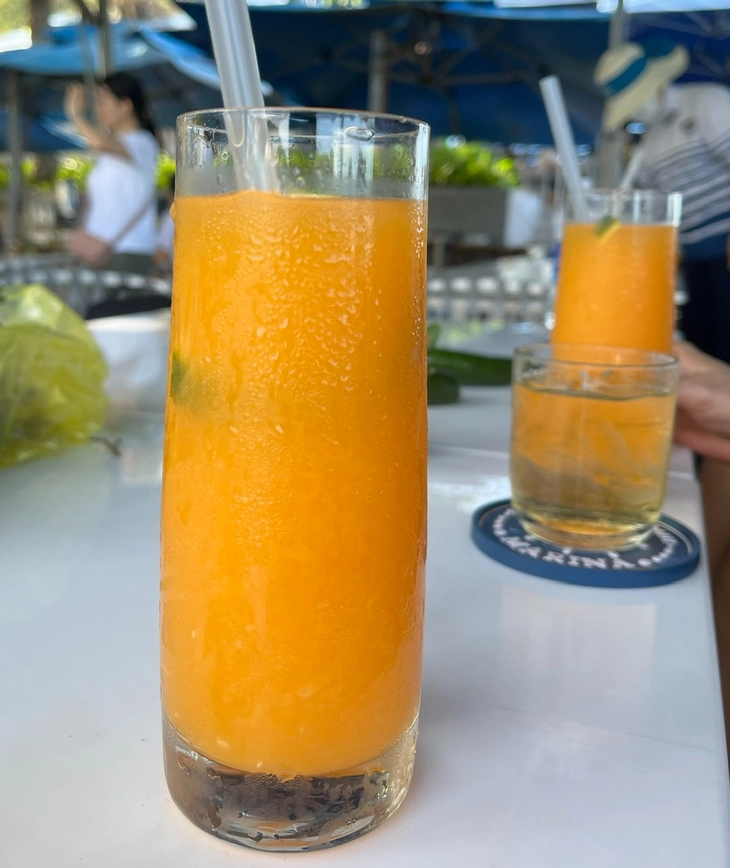
Fresh oranges and fresh orange juice are often considered delicious and nutritious food/drink - Illustration photo
Oranges may also be beneficial for reducing visceral fat. According to an article on Health.com, nutrients in oranges range from minerals like potassium and phosphorus to antioxidants like flavonoids that may help protect the body from certain diseases.
Hydrate the body
One orange provides about half a cup of water. Water needs vary from person to person, based on factors such as gender, age, activity level, and health status.
The body typically gets 20% of its fluid from food. Water-rich foods like oranges can help you meet your daily needs and stay hydrated.
Drinking enough fluids has many benefits, including:
Digestive support
Waste elimination
Lubricates joints
Prevent dehydration and constipation
Regulate body temperature
Digestive support
Each orange provides about 2.8 grams of fiber, equivalent to 10% of the daily value. Fiber also brings many benefits to the body such as helping to regulate blood sugar and insulin levels; supporting digestion; regulating bowel movements; increasing the feeling of fullness for longer.
However, consuming a lot of fiber in a short period of time can cause stomach discomfort, including bloating and gas. When supplementing with fiber, you should also drink more water to reduce the risk of constipation.
May help reduce belly fat
The fiber content in oranges may help reduce belly fat. A study of nearly 1,500 people with metabolic syndrome found that those who increased their fiber intake lost weight and belly fat after 12 months.
Excess belly fat increases inflammation and the risk of type 2 diabetes, high blood pressure, and some cancers. Oranges are also a source of flavonoids, a compound that may help reduce fat mass and disease risk when consumed in high amounts.
Immune System Support
One orange can provide nearly 10% of the daily value of vitamin C, which boosts the immune system and helps the body produce collagen.
One study found that citrus juices, especially orange juice, support immune function. Citrus juices have also been found to reduce inflammation, which may help prevent disease.

A glass of orange juice on a hot day helps quench thirst and reduce fatigue - Illustration photo
Supports iron absorption
The vitamin C in oranges helps the body absorb iron, which in turn helps the body use oxygen more efficiently. Iron deficiency can cause fatigue. Getting enough iron is especially important for women, as they are more likely to lose iron during menstruation.
Iron is also essential for people on a plant-based diet. The body absorbs iron from plant-based foods less efficiently than from animal-based foods.
Helps prevent certain diseases
Oranges are rich in flavonoids, which have antioxidant, anti-inflammatory, antiviral, and antibacterial properties. Studies have shown that antioxidants help protect the body from cell damage caused by oxidative stress. This cell damage can lead to inflammation, which is linked to diabetes, heart disease, and some cancers.
A study of more than 82,000 people found that high flavonoid intake was associated with a lower risk of depression, especially in older adults. Drinking orange juice every day may also help lower cholesterol levels. Healthy cholesterol levels reduce the risk of diabetes and heart disease.
Who should not eat oranges?
Oranges are generally healthy and safe to eat. However, eating oranges and drinking orange juice may come with some risks, including:
Aggravates symptoms of gastroesophageal reflux disease
Causes allergic reactions, although rare
Interaction with certain medications
Causes weight gain if drinking too much orange juice for a long time
Nutritional value of oranges
One orange provides the following nutritional values:
Calories: 72.8
Fat: 0.21g
Sodium: 12.6mg
Carbohydrates: 16.5g
Fiber: 2.8g
Added sugar: 0g
Protein: 1.27g
In addition to vitamin C and fiber, oranges contain potassium and folate, two essential nutrients. Potassium supports heart, muscle, and bone health. Folate is a B vitamin that helps the body make red blood cells and DNA.
Source: https://tuoitre.vn/trai-cam-tac-dung-suc-khoe-the-nao-ma-nguoi-dan-thuong-tang-nhau-moi-khi-bi-dau-20250516075954943.htm




![[Photo] Prime Minister Pham Minh Chinh chairs the meeting of the Government Party Committee Standing Committee](https://vphoto.vietnam.vn/thumb/1200x675/vietnam/resource/IMAGE/2025/8/23/8e94aa3d26424d1ab1528c3e4bbacc45)


![[Photo] General Secretary To Lam attends the 80th Anniversary of the Cultural Sector's Traditional Day](https://vphoto.vietnam.vn/thumb/1200x675/vietnam/resource/IMAGE/2025/8/23/7a88e6b58502490aa153adf8f0eec2b2)























































































Comment (0)